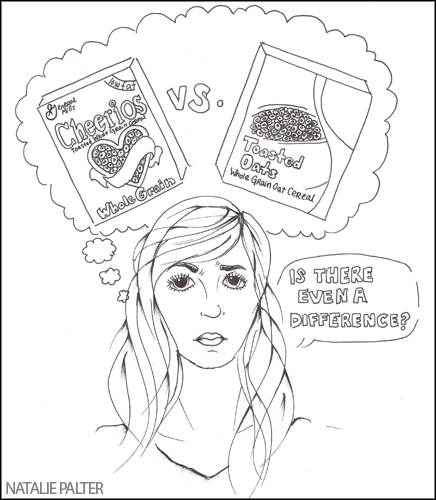
Advil versus generic Ibuprofen, True Religion versus simple jeans, Wonder bread, Uggs, Nalgene bottles, Starbucks. Brand names are common in today’s world, ranging from food to clothes, and medicine to colleges.
But is this obsession with brand names a result of an increase in materialism?
“Definitely,” says freshman Andi Kabiri. “I think that generic brands are usually associated with cheap [materials] and not good quality. The media is [a factor in] influencing people’s opinions on materialistic wealth.”
Fellow freshman Isik Yildiz states that materialism exists “because of the media and those magazines and modeling shows; and there is a lot of peer pressure in this world.”
“I think that people are materialistic only because a lot of the time we attribute physical materials with wealth and happiness, and we all know it never really works out well,” says senior Jamison Hall.
Materialism is probably the biggest factor contributing to this brand name craze, yet the question about whether this craze is justified still exists. Are there any differences between the widely known brand names and the generic store brands?
Senior Jenny Shields says, “Sometimes. You can find stuff that are just the same but cost way less. But sometimes [the more expensive clothing] feels a lot better.”
“I think it depends on the product,” says Kabiri. “I think for clothes, it depends on the fabrics and materials they use. For food, it’s the ingredients and the way it’s prepared. So there is a difference.”
“We look for specific brands because we like the way things cook and taste. Sometimes the generic just does not have the quality that we want when it comes to food,” explains Hall.
Although there may not be a visible difference between a generic brand and brand named ones, it seems that consumers are more willing to purchase items with names they are familiar with.
These large names provide a sense of reassurance to those who buy them. “I would spend more money on the prescription brand because I would think it was ‘safer’,” says Kabiri.
A 2008 article from Newsweek explains the ever-changing ideas of society on the importance of choosing a college. Enrollment in a certain college can ultimately end up being an investment for the future.
Senior Kalie San Felipe agrees with this sentiment. “The college selection process definitely resembles that of daily purchasing – you have to try out different products, maybe even get swayed by the name brand, but in the end, you end up choosing whatever product (or school) best suits your own needs and goals.”
Several solutions have been posed to correct this misconception regarding brand names. “I think there are a lot of people who put a negative connotation on generic brands. I think we should try to promote a positive connotation of it [through] advertising,” says Kabiri.
Others believe the problem of materialism is never-ending and instead is only correctable by the individual.
“I think people can correct it for themselves by being around people who don’t care about [brand names]. It just comes down to who you choose to hang out with,” explains Shields.
So although the general consensus may be that people are ultimately materialistic, San Felipe states, “There are definitely materialistic people in the world, but it seems that for the most part, people envy those who can find cute clothes at ridiculously cheap prices more so than those who splurge on brand name items.”





